Mozart: La Clemenza Di Tito (Cambreling)
Introduction
A performance of Mozart`s final opera (well, it was written around the same time as The Magic Flute, in 1791) by the Opéra National de Paris.
The synopsis of the 2 Acts (as cut-down as I could manage) is as follows…
Rome, AD 79
Vitellia is madly in love with the Emperor Tito, although she knows she shouldn`t really be as her father was murdered by Tito`s father many years before. She would do anything to be his bride, but he has his (political) eyes on the daughter of the King of Judea, Berenice She decides to persuade Sesto, Tito`s best friend (and who is madly in love wiith Vitellia himself), to betray the emperor and have him killed during a riot.
The news that Tito, in the meantime, has relinquished his claim to Berenice is relayed by Annio, another friend of Sesto. Annio is in love with Sesto`s sister, Servilia, and asks Sesto to gain Tito`s permission for them to get married. Sesto agrees.
Tito, however, has decided to look closer to home, and tells Annio and Sesto that he intends to marry Servilia. Annio bravely informds Servilia himself, but she refuses to give up her love for him, and goes to the Emperor. She tells Tito that she would be honoured to be his bride, but he should understand her true feelings. Tito is moved by her honesty and agress to her marriage with Annio, wishing that all his subjects were as honest and forthright with him.
Vitellia sees Servilia, and after some misunderstandings about who is to be Empress after all, she demands that Sesto carry out their initial agreement. Tito sends Annio and Publio (the prefect of the guard) informing Vitellia that the Emperor now wishes her to be his bride, but it is too late to recall Sesto.
Sesto sets the Capitol on fire and attacks who he thinks is the Emperor. Tito is mourned by the whole city, but in fact, Sesto, in all the confusion, attacked a fellow-conspirator, Lentulo. Lentulo survives, and names Sesto as the man who organised everything. Sesto is arrested, but refuses to implicate Vitellia, and is condemned death. Tito, despite Sesto`s confession, cannot bring himself to sign his friend`s death warrant, and actually decides to pardon Sesto. Vitellia enters, and not knowing that the Emperor has decide to show clemency, she admits her guilt and the motive behined her actions. In front of the crowd, Tito forgives them all, as he valaues their repentance just as much, if not more than, their fidelity.

Video
The DVD is presented in NTSC (16/9 Anamorphic). Everything is as clear as it should be, despite some rather obvious intrusions from the head and baton of the conductor at the bottom of the screen.
The production is an interesting one, with the set and costumes looking rather modernist, with elements from ancient Rome, the late 18th century and mid 20th century . Some of the symbolism went right over my head, certainly in the case of what seemed like a large baked potato on stage with a young lady squirming about in it. Although this could have been an apple with a bite out of it, and the young lady was representing the grub which was the underlying treachery about to be played out…ah well, at least it didn`t get in the way of the music.
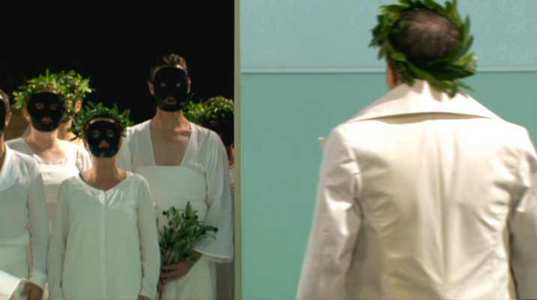
Audio
The sound (either in LPCM stereo or DTS) is incredibly clear, and creates (mostly) a lovely balance between the singing and the orchestra, and also within the orchestra itself, which may point to some careful placing of pit mircrophones. However, someone should really have turned them off at times as one or two cellos couldn`t help check their tuning loudly (at least that`s how it sounded) during applause, and not always at the end of an act. The band also chatted loudly at the end of the opera…cue more cello tuning - although it`s a bit late then, chaps!
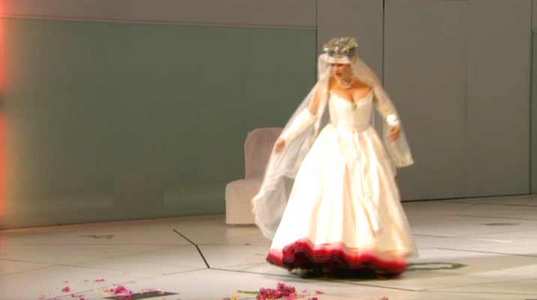
Features
We are treated to an hour-long documentary on the opera, with the performers explaining their roles, and some input from from the directors (Ursel and Karl-Ernst Herrmann). Much of this is a retelling of the plot, and I would have liked more information on the production, but still, it`s a watchable film.
There are subtitles in English, Spanish, German, French and Italian, and the DVD comes with a booklet containing a short essay on the origins of the opera.

Conclusion
It`s difficult to know where to place La Clemenza… By this, I mean that I know noone who would name it as their favourite Mozart opera, yet everyone seems to accept that as it`s one of his final works, then it has to be good.doesn`t it?
It`s certainly true that it doesn`t have the impact and enduring popularity of the da Ponte operas (Marriage of Figaro, Don Giovanni etc), which is a shame, as it contains some of Mozart`s most inventive music, where he had a hand in it (it`s generally agreed that much of the secco rectitative was not written by him, although this should be unimportant if the recit. they DO use doesn`t get in the way).
Hearkening back to the world of `Idomeneo` where the themes of friendship and loyalty are paramount, we see none of the lighter, almost comedic quality of his other later operas, and the ending is far from a happy one. Even the creation of this one was fraught with more than the usual setbacks, so perhaps with more time..anyway, we`ll never know.
As a performance, there is very little wrong here.
The conducting from Sylvain Cambreling produces lively and precise playing from the orchestra, and he keeps up the pace of the whole work nicely, despite the rather jarring gear-changes for the overture`s second subject. In this respect, I certainly prefer Andrew Davis`s performance from Glyndebourne.
The singers also give rather splendid performances, and the acting doesn`t appear stagey, despite some of the gestures they are asked to make by the directors.
Susan Graham (Sesto), creates a noble yet tragic figure of the would be traitor, and is well matched by `his` pal Annio (Hannah Esther Minutillo - who has some frighteningly low notes).
Ekaterina Siurina (Servillia) is quite a discovery for me. In addition to being incredibly lovely (I could happily watch her contributions on the documentary all day), she has an equally gorgeous voice. It`s a shame she only has one rather short aria for herself, but throughout the opera, she is controlled and utterly musical.
Catherine Negelstad (Vitellia) justifiably gains the most applause at the end. She is quite able to explode with jealousy, love and repentance in equal measure, but never goes over the top in either her acting or singing. Her performance of `Non più di fiori..` is definitely a highlight for me.
Christoph Prégardien (Tito) was an interesting choice for this role. He is better know for singing Schubert lieder, and this shows in his ability to carry across a huge amoung of meaning in musical phrases, and actually showing it in his face as well. It also seems to be a bit of a drawback, as his voice, although perfectly suited to the lieder repertoire, doesn`t appear powerful or dramatic enough for this role. Despite having a very fine voice, I was left feeling slightly underwhelmed by `Se all`impero, amici Dei`, and so I popped back to my Andrew Davis DVD again to compare with the Philip Langridge interpretation, and to be honest there`s no contest.
But…overall, this performance is up there with the best of them, and contains examples of ensemble work at its finest. If we are presented with more Mozart of this standard during the 250th anniversary year, then things are looking very good indeed.
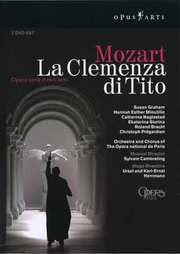
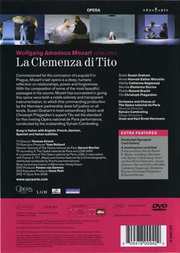














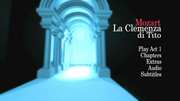






























Your Opinions and Comments
Be the first to post a comment!